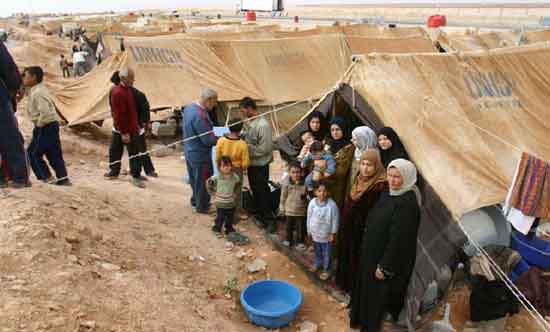 Cardinal Cardinal Theodore E. McCarrick, Archbishop Emeritus of Washington, recently traveled to the Middle East and spoke with Iraqi refugees there. In a powerful piece in the The New York Review Of Books he described his experience:
Cardinal Cardinal Theodore E. McCarrick, Archbishop Emeritus of Washington, recently traveled to the Middle East and spoke with Iraqi refugees there. In a powerful piece in the The New York Review Of Books he described his experience:
The humanitarian consequences of this seven-year war on Iraqi civilians are too often unreported. Since 2003, 2.5 million Iraqis have fled the country, mainly to Jordan, Syria, and Lebanon, while another two million have been dislocated inside Iraq, many of whom are now living in makeshift camps on the outskirts of Baghdad and other cities. Neighboring countries have by and large been willing to allow in fleeing Iraqis, though often without offering them any legal status; and this influx has created severe strains on their own populations and resources. To be fair, the international community, led by the United States, has provided basic assistance to these Iraqis and a small number have been resettled in third countries, including in the US and Europe, but a long-term solution to this mass displacement has been elusive.
Of the Iraqi refugees I visited in Jordan, for example, many lived in small apartments already occupied by one or more families, with their savings almost depleted, with no legal residency, and with little hope for long-term employment in the host country. Some families have been forced to send their children to work as domestic help during the day, keeping them out of school and leaving them vulnerable to exploitation.
More and more Iraqi girls and boys have become subject to human trafficking and child prostitution. One young woman, a victim of sexual violence, told me of the pain of being ostracized by her family, who held her responsible for her having become a victim. Nearly everyone I met expressed a fear of returning to their former homes in Iraq—if in fact their homes were not already taken over by others—particularly now that the US troops are leaving.
Moreover, the international community has been reducing its support, not increasing it as it should. The United States has maintained its level of funding, but has not raised it sufficiently to meet current needs. This year, the United Nations High Commissioner for Refugees (UNHCR), the agency charged with responding to the refugee crisis, says it is 25 percent short of the nearly $700 million necessary to meet projected requirements. According to a recent report, “So far, resettlement countries have admitted fewer than half the 80,000 [Iraqi] cases referred by UNHCR. The vast majority of referrals are designated for resettlement in the United States.” Some 17,000 are to be admitted to the US during 2010.
With the withdrawal of American troops, the situation could grow worse. Violence could increase and many Iraqis who until now have remained in Iraq may now be forced to flee, increasing the number of refugees in the region. The United States has yet to announce a plan for handling humanitarian challenges that could follow withdrawal. It is our moral responsibility to do so.
Iraqi Christians continue to be targets of systematic violence, especially in Mosul and Ninevah. These Christians belong to ancient communities that once grew and thrived in Iraq but now face potential disappearance there. Christians in Iraq told me of threats they had received to abandon their faith or risk death. Others described how their homes or churches had been attacked.
On August 25, at the time of the US troop withdrawal, Iraqi soldiers reportedly filled the streets of Mosul, anticipating a resurgence in sectarian violence. If there is not an increase in security in Christian neighborhoods, any chance for Christians to return to Iraq in the near future and reestablish their communities is not bright.
Read the rest here.







